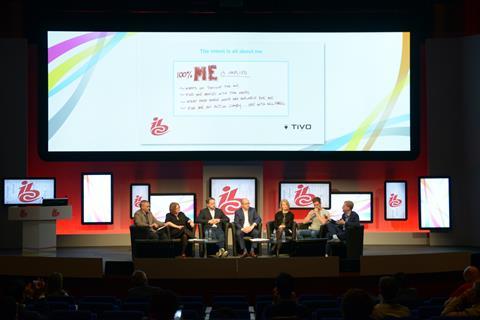IBC2017: Consumers have been given access to an ever-increasing range of content and platforms but don’t always have the tools to navigate and discover programmes.

The answer to making things simple again is voice, according to TiVo, one of the original disruptors of digital TV.
Speaking at IBC during a session on the consumer experience, TiVo Senior Director of Marketing Charles Dawes claimed that the company’s natural language voice controls – which are currently being integrated into Sky Q’s premium service - would radically simplify the user experience.
“It can take more than 10 clicks to find the search.
“Voice search is a quick and simple way to get to content more easily,” he said.
TiVo’s new solution claims to enable natural language voice searches for finding digital content across linear TV and VoD.
Viewers can find their desired programme by pressing and holding the voice button on the side of a touch remote and simply saying what they’re looking for.
“Voice search is a quick and simple way to get to content more easily” - Charles Dawes
Dawes said that the technology is based around the conversational way that people really speak and takes into account pauses in requests such as “Dawes said that the technology is based around the conversational way that people really speak and takes into account pauses in requests such as “Find me an action comedy….one with Tom Hanks.”
Viewers can also use their voices to search for films from a specific director or actor and even through using a selection of well-known movie quotes such as “Show me the money!”
The future user experience
TV is falling behind other content mediums in design terms, writes Mark Mayne.
Fabian Birgfeld, CEO & Co-Founder, W12 Studios, said: “TV must do better – there is some catch-up to be done when you compare it with other platforms. People talk about the paradox of choice, because there’s so much content, but we can’t seem to design an interaction method that solves the problem.
“I always use the metaphor of the supermarket - nobody complains about supermarket choice, because the design is understood, and allows people to choose freely.”
He reminded the packed auditorium attending “Future User Experience’ that the stakes are rising: “In the future, 20% of user interactions will take place via intelligent personal assistants – this will change the behaviours and expectations of the consumer. The tolerance for bad customer experience is dropping incredibly fast, and it’s thought that customer experience will overtake price and product as key brand differentiator by 2020.”key brand diast, and it’s thought that customer experience will overtake price and product as key brand differentiator by 2020.”
Senior Creative at Crackle and former UX Lead at the BBC Ida Olsen shared a series of tips for designers too, saying: “TV is about emotion, it brings people together, and not much has changed about the values people ascribe to the TV screen since 60s – in many ways there is nothing new.”60s – in many ways there is nothing new.”
Olsen’s tips for design strategy included holistic design. “Scattered teams and tools that break down workflows don’t help this…I don’t have a solution for all that, but I do believe that everyone from QA to product person to designer - should have face to face time with developers and the customer – it’s important to know who you’re designing for!”
She also stressed the need for consistency in tone of voice and language. She said: “Humans are very good at pattern recognition so tap into that and work with it not against it.
“Think about steps before and after an object you’re designing, for example a content page – don’t accept thinking about it in isolation, it’s essential to have the context of how whole thing hangs together.”or example a content page – don’t accept thinking about it in isolation, it’s essential to have the context oor example a content page – don’t accept thinking about it in isolation, it’s essential to have the context of how whole thing hangs together.”whole thing hangs together.”
Fellow panelist Freeview Australia Chief Executive Liz Ross also shared her insight into research which was gathered ahead of launching Freeview + in her home territory.ellow panelist ellow panelist Freeview Australia Chief Executive Liz Ross also shared her insight into research which was gathered ahead of launching Freeview + in her home territory.
“People don’t like it when you only provide a grid text based guide for browsing or relying on the use of coloured buttons.
“You need to be able to make content search and discovery easy and integrate it into all browsing screens.”
Discovery Communications Senior VP of Data and Analytics Chris McGrath also advised broadcasters to think carefully about how they programme their recommendation engines.
“Think about the bias that you are putting in the algorithm. If you like shows such as Breaking Bad, then you usually get reccomendations , then you usually get reccomendations for lots more shows with anti-heroes in them – there’s not a whole lot of variety and it can result in audience , then you usually get reccomendations for lots more shows with anti-heroes in them – there’s not a whole lot of variety and it can result in audience fatigue which may flatten out the success a show,” he warned.success a show,” he warned.
























No comments yet